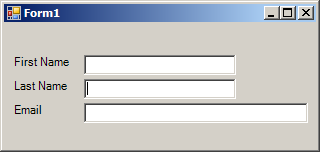
Imports System.Windows.Forms
public class EventHandlerForMoreThanOneComponent
public Shared Sub Main
Application.Run(New Form1)
End Sub
End class
Public Class Form1
Inherits System.Windows.Forms.Form
#Region " Windows Form Designer generated code "
Public Sub New()
MyBase.New()
'This call is required by the Windows Form Designer.
InitializeComponent()
'Add any initialization after the InitializeComponent() call
End Sub
'Form overrides dispose to clean up the component list.
Protected Overloads Overrides Sub Dispose(ByVal disposing As Boolean)
If disposing Then
If Not (components Is Nothing) Then
components.Dispose()
End If
End If
MyBase.Dispose(disposing)
End Sub
'Required by the Windows Form Designer
Private components As System.ComponentModel.IContainer
'NOTE: The following procedure is required by the Windows Form Designer
'It can be modified using the Windows Form Designer.
'Do not modify it using the code editor.
Friend WithEvents ImageList1 As System.Windows.Forms.ImageList
Friend WithEvents txtFirstName As System.Windows.Forms.TextBox
Friend WithEvents txtLastName As System.Windows.Forms.TextBox
Friend WithEvents txtEmail As System.Windows.Forms.TextBox
Friend WithEvents lblFirstName As System.Windows.Forms.Label
Friend WithEvents lblLastName As System.Windows.Forms.Label
Friend WithEvents lblEmail As System.Windows.Forms.Label
<System.Diagnostics.DebuggerStepThrough()> Private Sub InitializeComponent()
Me.components = New System.ComponentModel.Container()
Me.txtFirstName = New System.Windows.Forms.TextBox()
Me.txtLastName = New System.Windows.Forms.TextBox()
Me.txtEmail = New System.Windows.Forms.TextBox()
Me.lblFirstName = New System.Windows.Forms.Label()
Me.lblLastName = New System.Windows.Forms.Label()
Me.lblEmail = New System.Windows.Forms.Label()
Me.SuspendLayout()
'
'txtFirstName
'
Me.txtFirstName.Location = New System.Drawing.Point(80, 32)
Me.txtFirstName.Name = "txtFirstName"
Me.txtFirstName.Size = New System.Drawing.Size(152, 20)
Me.txtFirstName.TabIndex = 1
Me.txtFirstName.Text = ""
'
'txtLastName
'
Me.txtLastName.Location = New System.Drawing.Point(80, 56)
Me.txtLastName.Name = "txtLastName"
Me.txtLastName.Size = New System.Drawing.Size(152, 20)
Me.txtLastName.TabIndex = 2
Me.txtLastName.Text = ""
'
'txtEmail
'
Me.txtEmail.Location = New System.Drawing.Point(80, 80)
Me.txtEmail.Name = "txtEmail"
Me.txtEmail.Size = New System.Drawing.Size(224, 20)
Me.txtEmail.TabIndex = 3
Me.txtEmail.Text = ""
'
'lblFirstName
'
Me.lblFirstName.AutoSize = True
Me.lblFirstName.Location = New System.Drawing.Point(8, 32)
Me.lblFirstName.Name = "lblFirstName"
Me.lblFirstName.Size = New System.Drawing.Size(59, 13)
Me.lblFirstName.TabIndex = 4
Me.lblFirstName.Text = "First Name"
'
'lblLastName
'
Me.lblLastName.AutoSize = True
Me.lblLastName.Location = New System.Drawing.Point(8, 56)
Me.lblLastName.Name = "lblLastName"
Me.lblLastName.Size = New System.Drawing.Size(59, 13)
Me.lblLastName.TabIndex = 5
Me.lblLastName.Text = "Last Name"
'
'lblEmail
'
Me.lblEmail.AutoSize = True
Me.lblEmail.Location = New System.Drawing.Point(8, 80)
Me.lblEmail.Name = "lblEmail"
Me.lblEmail.Size = New System.Drawing.Size(33, 13)
Me.lblEmail.TabIndex = 6
Me.lblEmail.Text = "Email"
'
'Form1
'
Me.AutoScaleBaseSize = New System.Drawing.Size(5, 13)
Me.ClientSize = New System.Drawing.Size(312, 125)
Me.Controls.AddRange(New System.Windows.Forms.Control() {Me.lblEmail, Me.lblLastName, Me.lblFirstName, Me.txtEmail, Me.txtLastName, Me.txtFirstName})
Me.Name = "Form1"
Me.Text = "Form1"
Me.ResumeLayout(False)
End Sub
#End Region
Private Sub Names_TextChanged(ByVal sender As System.Object, ByVal e As System.EventArgs) Handles txtFirstName.TextChanged, txtLastName.TextChanged
txtEmail.Text = txtFirstName.Text & "." & txtLastName.Text
End Sub
End Class